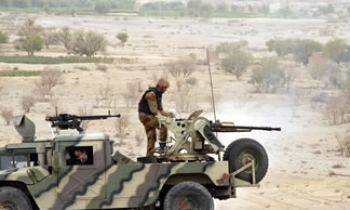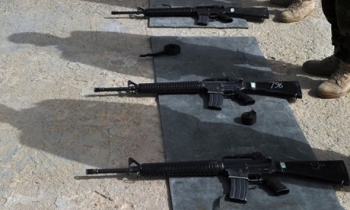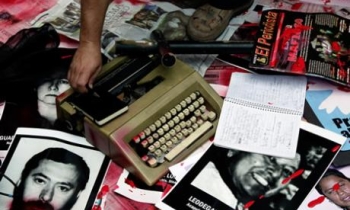The Sri Lanka military air strike last week on the Voice of Tigers, the radio station of the Tamil Tiger rebels in the north of the country, is being described as a war crime. Three of the station’s staff, who had not been given any warning, and six other civilians were killed in the bombardment by air force jets.
"Voice of Tigers is a propaganda radio operated by the LTTE rebels, but the rules of war are clear — military bombardment and bombing must be limited to strictly military targets," Reporters sans Frontières (RSF) said. "The government in Colombo uses the Geneva Conventions to condemn LTTE crimes but forgets the conventions when it bombs what is a civilian installation and therefore protected by the conventions."
The air strike on Voice of Tigers, located near Kilinochchi, took place in the afternoon and left a total of nine civilians dead (including three of the station’s employees) and around 10 civilians wounded. The Tamilnet website identified the dead employees as Isaivizhi Chempiyan (a former presenter), Suresh Linbiyo (a technician) and T Tharmalingam.
The bombing was carried out as the station was providing coverage of the annual War Heroes’ Day ceremonies, which LTTE observes in the regions it controls. According to Tamilnet, broadcasts were able to continue with the help of another clandestine transmitter.
The Sri Lankan military confirmed that the air force had destroyed the "clandestine Tiger terrorists radio station" in Kilinochchi. Previous air strikes in October 2006 caused serious damage to the station and wounded two employees.
“IFJ strongly believes that all media workers, regardless of the views of the organisations for which they work, must be regarded as non-combatants in conflict zones,†said the International Federation of Journalists (IFJ)'s Asia-Pacific Director, Jacqueline Park. “While we do not endorse or support the views of any particular media organisation, we strongly denounce the bombing of VOT as an attack on freedom of speech and a serious violation of international law.â€
The Sri Lankan Air Force launched a similar attack on a VOT radio tower on October 17, 2006. At that time IFJ called on Sri Lanka’s Government to act in accordance with its obligations under Article 79 of the Additional Protocol to the Geneva Convention to respect the safety of journalists as non-combatant civilians. “IFJ again calls on the Government of Sri Lanka to abide by its commitments under the Geneva Convention and refrain from deliberate attacks that endanger the lives of civilians, including media workers,†Park said.
The Berne-based International Humanitarian Fact-Finding Commission (created under Protocol 1 of the Geneva Conventions), told RSF last year: "Deliberate attacks against journalists and infrastructure belonging to or used by the press constitute a serious violation of international law. Journalists have the right to perform their role in territories where fighting is taking place."
News media in other countries have been targeted as "propaganda media," setting very dangerous precedents for the press. NATO bombed Serbian radio and TV headquarters in Belgrade in April 1999, killing 16 employees. The Israeli military blew up the Voice of Palestine radio and TV building in Ramallah, on the West Bank, in January 2001. And the Kabul bureau of the pan-Arab TV station Al-Jazeera was the target of a US air strike on November 12, 2001.









